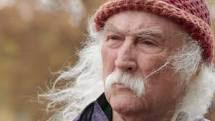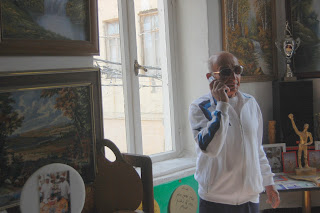Re-Remembering David Crosby
Soon, we all plunged together with the white-maned Crosby-
surprised as anyone to still be alive – through his glorious, tragic, manic
life. Completely candid, Crosby was clearly in the mood to repent and used the
film as his confession box. Sorrowfully, he mentioned that none of the major
artists he had worked with (e.g Neil Young, Roger McGuinn, Graham Nash, Steven
Stills) would talk to him today. Amazingly he can still hit the top notes like
no other and is performing a recording with cool young artists less than half
his age.
When the lights went up the audience applauded, weakly. I wondered
how many of them felt any real connection to his story of rebellion, rock’n’roll
and self-abuse set against turbulent America in the ‘60s and ‘70s. Beyond the
fringes of the Israeli left and the Tel Aviv bohema, that brand of smash -the-system-and-let’s-get-stoned counter culture never really caught on in an Israel already
high from winning the Six Day War. Legend has it that in the early 1960s, Golda
Meir prevented the Beatles from performing in Israel since she was afraid that
would “corrupt the youth.”
I only came across Crosby myself (as well as CNY and
CSNY) after I arrived in Israel in 1972. Teach Your Children, Helpless,
Our House could be heard wafting over many a kibbutz swimming pool from a
cassette tape imported by a long haired American volunteer. Of course, I knew Graham Nash,
Crosby’s partner in sublime harmony, from the British pop group, the Hollies.
Later I would play Crosby’s first solo album If I Could Only
Remember My Name over and over in the echoing space of our living room in
Baka’a in Jerusalem, the glorious harmonies rising to the tall ceiling along with
the hash smoke. The album would then be replaced with the other LPs in a long
wooden ammunition box I had lugged home from the army. That’s how it is in Israel:
the liberal, freedom-seeking culture of the west smacks up against the local
reality. An uncomfortable co-existence.
To this day, although almost bald, I sometimes involuntarily
belt out the first few dramatic bars of “Almost Cut My Hair”.
Playing guitar in an open tunings is always a joy. Apart from
creating a pleasant drone, open tunings seem to change the whole playing
environment, encouraging you to seek out undiscovered new chords. Crosby has
his own open tuning – EBDGAD. Play that open chord and you are instantly
transported to Crosby mode. I happened to discover this tuning a few months ago
and after a few days of playing around with it wrote and recorded an
instrumental that I named Crosby.
Thanks to Wetransfer I sent my recording to Itai Kriss in
New York who added a flute part that I think Crosby would approve of.




Comments